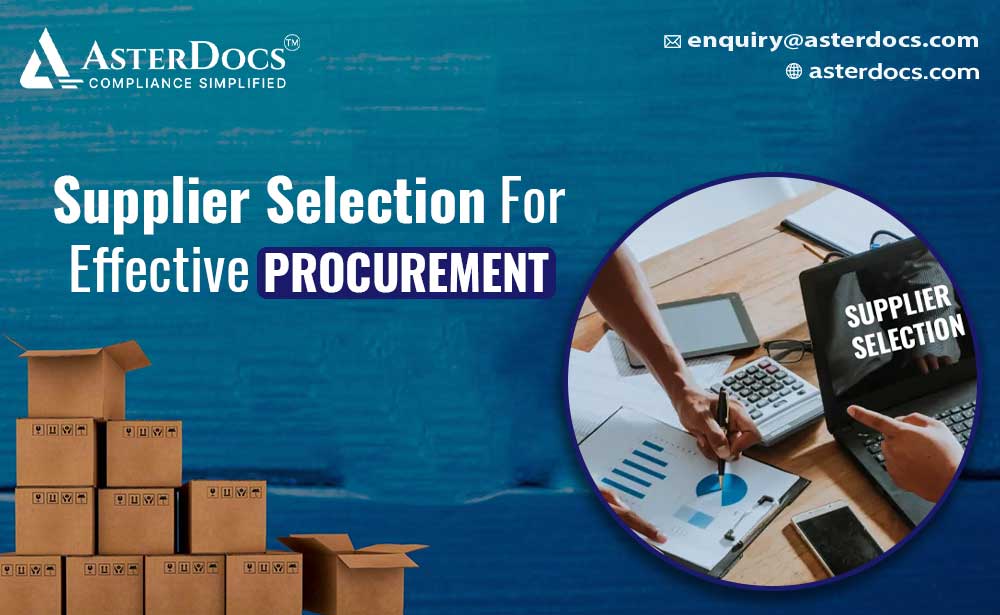In the intricate web of procurement, supplier selection is a pivotal point of influence, steering the course of businesses toward success. In this blog, we’ll delve into the importance of selecting your supplier, its intricate process, and the key factors determining its significance.
The Core of Procurement: Supplier Selection
Supplier finalization is a multifaceted process within the realm of procurement. It is the gateway to establishing lasting relationships with suppliers who meet your organization’s needs. Here’s a closer look at why this aspect is so crucial.
Quality Assurance
The first and foremost reason for the critical role of selecting a supplier is ensuring the quality of the products or services you procure. By selecting suppliers known for their quality standards and consistency, you reduce the risk of defects, delays, or dissatisfaction among your customers. It’s the cornerstone for delivering quality to your clients.
Cost Management
Efficient selection can significantly impact your cost management strategy. Choosing suppliers offering competitive pricing and favorable terms can optimize your expenses and improve your overall financial health.
Risk Mitigation
Risk in the procurement process can take various forms – from supply chain disruptions to quality issues. Careful selection of vendors enables you to identify and mitigate these risks by choosing suppliers with solid track records, compliance with regulations, and robust risk management processes.
Scalability and Growth
As your business grows, so do your procurement needs. An effective selection process ensures you can scale your operations and extend your product or service offerings without compromising quality, cost, or timeliness.
The Supplier Selection Process
The vendor selection process isn’t a one-size-fits-all approach. It’s a tailored strategy that should align with your organization’s goals and requirements.
However, it generally involves the following key steps:
- Needs Assessment: Begin by clearly defining your procurement needs. What products or services do you require, and in what quantity?
- Supplier Identification: Identify potential suppliers who can meet your needs. This can involve market research, industry networks, or supplier databases.
- Supplier Evaluation: Evaluate potential suppliers based on critical criteria, including quality, cost, reliability, and compliance.
- Selection: After a thorough evaluation, choose suppliers that most closely align with your needs and objectives.
- Negotiation: Negotiate with selected suppliers to establish mutually beneficial terms and agreements.
- Collaboration: Establish a collaborative relationship with chosen suppliers, fostering transparency and open communication.
Critical Factors To Consider
Several factors influence the selection of suppliers in procurement:
- Quality and Consistency: Suppliers should have a proven track record of consistently delivering quality products or services.
- Pricing: Competitive pricing that aligns with your budget and financial goals is essential.
- Reliability: Suppliers must be reliable, ensuring on-time delivery and minimal disruptions to your operations.
- Compliance: Compliance with industry standards, regulations, and ethical practices is paramount.
- Scalability: Suppliers should be able to scale their operations alongside your business growth.
- Flexibility: In the ever-changing landscape of business, flexibility in accommodating changes or challenges is valuable.
- Geographical Location: Consider where suppliers are located and their proximity to your business, which can affect logistics and shipping costs.
- Sustainability: Organizations increasingly prioritize sustainable practices in their criteria to meet ethical and environmental objectives.
In Conclusion
Supplier selection is undeniably a linchpin in procurement, impacting product and service quality, cost, and risk management. It involves a comprehensive process of assessment, evaluation, and negotiation. The choices made while selecting can either propel an organization toward prosperity or hold it back. By carefully considering factors like quality, reliability, pricing, and sustainability, businesses can master the art of choosing the best suppliers and securing their path to success in procurement.
If you wish to achieve true excellence in procurement, remember that your suppliers are the foundation upon which your successes will be built.













